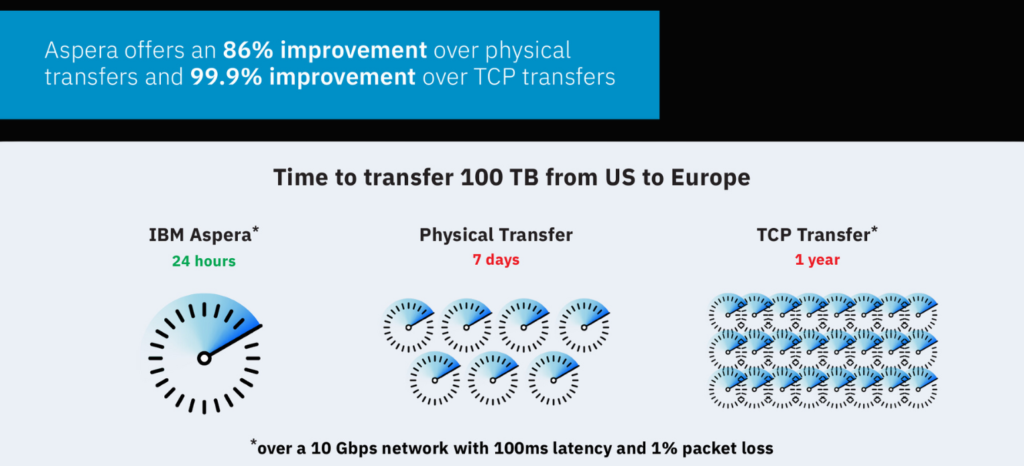
In an increasingly interconnected digital world, the need for rapid and secure data transfer over vast distances has never been more paramount. Among the various solutions available, IBM Aspera stands out, particularly for its innovative Fast and Secure Protocol (FASP).
The FASP protocol is the cornerstone of Aspera’s ability to transfer data quickly and reliably over long distances. Traditionally, protocols like TCP (Transmission Control Protocol) and UDP (User Datagram Protocol) have been used for data transfer. TCP is known for its reliability and secure connections but suffers from severe performance degradation over long distances and in the presence of packet loss. UDP, however, does not have these limitations but lacks the reliability and session-based features of TCP.
FASP ingeniously combines the best of both worlds and more. It maintains the session-based, secure, and reliable transfer characteristics of TCP, while also incorporating the high-speed and distance-agnostic qualities of UDP. This integrated approach enables FASP to optimise bandwidth utilisation, adaptively manage network congestion, and prioritise traffic, ensuring efficient and fast data transfer regardless of distance or network conditions.
Real-World Implications and Benefits
The real-world implications of IBM Aspera, powered by the FASP protocol, are vast and varied. For businesses, this means the ability to transfer large files and data sets, like software updates or media content, across continents in a fraction of the time traditionally required. A case in point is the transmission of 100 TB from US to Europe. Using a 10 Gbps network with 100ms latency and 1% packet loss, this could take 1 year by conventional methods, whereas with Aspera, it is feasible in just 24 hours.

PDF (www.ibm.com)
Such efficiency is not just about speed; it’s about reliability and predictability. Businesses can plan and execute data transfers with confidence, knowing that the timeframes will be consistent and reliable.
The advantages extend to various sectors. In the Media & Entertainment industry, the transfer of high-definition video content across international borders is an essential and routine operation. Within the realm of Software Development, the distribution of substantial build versions to global testing teams represents a critical aspect of the development cycle. In the Oil & Gas sector, the transportation of extensive seismic data sets to multiple data centers for comprehensive analysis is a fundamental process. And in the Energy industry, ensuring the rapid and dependable conveyance of energy infrastructure inspection data sets is imperative. In these scenarios, Aspera’s FASP protocol, as utilised by Dot Group, proves indispensable.
Security is a paramount concern in data transfer, and FASP addresses this with robust encryption and data integrity checks. The protocol ensures that data is not only transferred quickly but also securely, protecting against interception and tampering. This feature is particularly crucial for sensitive information, be it financial data, personal records, or proprietary content.
Dot Group plays a pivotal role in leveraging the advanced security features of Aspera, ensuring clients not only benefit from accelerated data transfer speeds but also receive comprehensive support in configuring optimal settings. This approach guarantees a seamless and secure data transit experience, affording clients the assurance that their data is protected throughout the transfer process.
Dot Group: The Leading European IBM Experts
As the leading European experts in IBM Aspera, Dot Group is here to help you design and implement a high-speed file transfer workflow tailored to your needs. With over 20 years’ experience of integrating IBM products and services into Dot Group’s offering and into our clients’ businesses, we are the go-to experts for organisations seeking to overcome the challenges of large-scale data transfer.
Beyond standard applications, Dot Group excels in customising solutions that align with specific organisational needs. Our skills extend to integrating Aspera technology into existing infrastructures, optimising data transfer processes, and developing bespoke applications that exploit Aspera’s advanced API. This approach allows us to provide tailored services that maximise the efficiency, security, and scalability of data transfers, catering to a wide range of industry requirements.
